Parallel Proceedings
- A probable cause determination must be made after the State Bar hearing.
- Defendant Nifong has the due process right to defend himself against the charges brought by the State Bar, as a regulatory agency, and against the charges subject to an inquiry by the superior court at separate points in time, and not simultaneously.
A reading of the statute helps to better understand the Appellate Court's decision and demonstrates clearly that Judge Hudson, in deciding to wait to evaluate whether the charges, if true, merit removal, and whether probable cause to believe them true exists, ignored the statutory directive to, within thirty days, review the affidavit and perform the "two-pronged" analysis required by law.“Upon filing of an affidavit seeking removal of a district attorney, the superior court is required to perform a two-prong analysis. First, the court must determine whether “the charges if true constitute grounds for suspension” of the district attorney. Second, the court must also find “probable cause for believing that the charges are true.” If the court finds both of these things exist, then a hearing is to be held upon the charges, upon due notice to the district attorney.”
"A proceeding to suspend or remove a district attorney is commenced by filing with the clerk of superior court of the county where the district attorney resides a sworn affidavit charging the district attorney with one or more grounds for removal. The clerk shall immediately bring the matter to the attention of the senior regular resident superior court judge for the district or set of districts as defined in G.S. 7A‑41.1(a) in which the county is located who shall within 30 days either review and act on the charges or refer them for review and action within 30 days to another superior court judge residing in or regularly holding the courts of that district or set of districts. If the superior court judge upon review finds that the charges if true constitute grounds for suspension, and finds probable cause for believing that the charges are true, he may enter an order suspending the district attorney from performing the duties of his office until a final determination of the charges on the merits. During the suspension the salary of the district attorney continues. If the superior court judge finds that the charges if true do not constitute grounds for suspension or finds that no probable cause exists for believing that the charges are true, he shall dismiss the proceeding." [emphasis added]
“Parallel proceedings involve simultaneous or successive investigations and/or litigation of separate criminal and civil actions by different government agencies arising out of the same set of facts.” [emphasis added]
“Perhaps there was a time when the term “parallel proceedings” was not part of the vocabulary of in-house counsel and private practitioners. If that were ever true, it is certainly not the case today. Parallel proceedings, and the challenges they give rise to, in terms of legal issues and strategic choices, have become commonplace.
“As a general rule, parallel proceedings is a term that refers to two different circumstances. The first involves two actions, one civil and one criminal, both brought by the government, either concurrently or successively, in which the allegations of unlawful conduct arise out of the same set of facts. The second involves two actions, again arising out of the same facts or transactions, and again concurrent or successive, one of which is brought by the government as a criminal prosecution or enforcement action, while the other is brought as a civil action by a private plaintiff.”
“Does the government have the power to conduct parallel civil and criminal proceedings, or should it be required to make a choice as to how to respond to perceived unlawful conduct? The Supreme Court supplied the answer to this question in United States v. Kordel, 379 U.S. 1 (1970), in which it stated that “[I]t would stultify enforcement of federal law to require a government agency invariably to choose either to forgo recommendation of a criminal prosecution once it seeks civil relief, or to defer civil proceedings pending the ultimate outcome of a criminal trial.”
“It is standard practice for different government agencies to investigate the same set of circumstances. Such parallel proceedings typically involve a civil or administrative entity, like the Internal Revenue Service or the Securities and Exchange Commission, and a criminal authority, like the U.S. attorney’s office. Parallel proceedings are not necessarily separate proceedings — they often involve significant cooperation and coordination among government agencies. These investigations may be simultaneous or sequential and they can result in potential sanctions ranging from administrative orders (disbarment, disgorgement, etc.) to imprisonment.”
“5-13.1 DEFINITION OF PARALLEL PROCEEDINGS.“Parallel proceedings are defined as situations where both criminal and civil investigations/cases are in progress at the same time. An example would be where a trustee is conducting an adversary proceeding to recover property in a chapter 7 case, while, at the same time, there is a criminal investigation of the debtor for bankruptcy fraud involving concealment of the same asset..“5-13.2 NEED FOR PARALLEL PROCEEDINGS.“Because both civil and criminal investigations and proceedings may consume a great deal of time, it is usually impractical to hold one in abeyance for any substantial length of time while the other proceeds to conclusion. Thus, it is normal for both criminal and civil cases to proceed at the same time. Due consideration must be given to both proceedings to ensure that one does not improperly impact the other.”
“We do note, however, that concurrent disciplinary proceedings against Judge Ryman have concluded in the Judicial Tenure Commission and are now pending on petition for review before this Court. These Tenure Commission proceedings involve a number of charges of misconduct concerning activities both prior to and during Judge Ryman's judicial tenure. The present State Bar and General Court Rules regarding the jurisdiction of the State Bar Grievance Board (State Bar Rules 15 and 16) and the Judicial Tenure Commission (GCR 1963, 932) appear to permit such parallel proceedings (Cf. In re Kapcia, 389 Mich 306; 205 NW2d 436 [1973]).” …“We conclude that the hearing panel's and board's findings and conclusions are properly supported on the whole record. We further conclude that these findings and conclusions fully support and warrant disciplinary action.”
“The following is a sample of the representations handled by Mr. Lynch:“Defense of attorney in parallel proceedings before the Grievance Committee and in District Court, resulting in dismissal for the Defendant attorney.”
“We regularly represent corporate officers and directors in both judicial and regulatory proceedings, covering cases involving insider trading, stock manipulation, revenue recognition issues, other accounting practices, mergers and acquisitions, and issues of corporate control and management. We routinely provide clients with securities advice.
“We frequently represent parties in parallel proceedings that include securities class actions, Securities Exchange Commission regulatory and enforcement matters, and grand jury proceedings.”
“We understand and have had long experience in dealing with “parallel proceedings,” which involve regulatory, criminal, and civil issues simultaneously. Depending on how matters are investigated and prosecuted by the government and private parties, these may include:
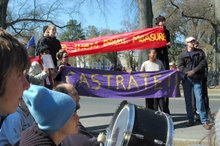





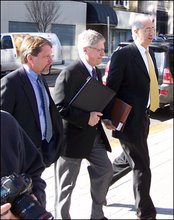
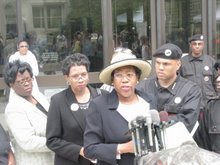
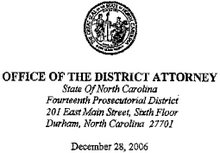
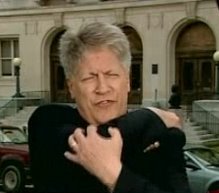

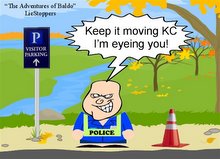

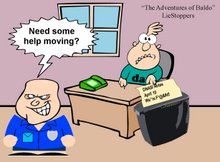

















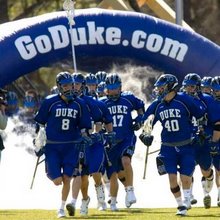

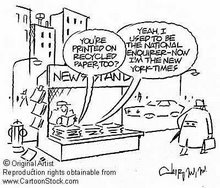

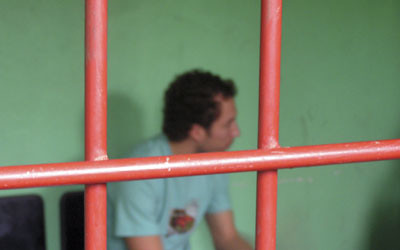



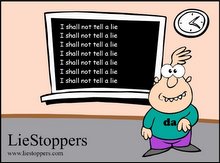






10 comments:
Judge Hudson's decision to stay the petition appears to be without legal authority. The statute uses mandatory language ("shall") that appears to leave no room for granting a stay. Ms. Brewer should appeal. Since you've done so much research, why not volunteer to help her draft the appeal documents?
Hudson can't get around the probable cause test because of the state bar findings and Meehan's testimony, so Hudson doesn't want to get as far as the probable cause test. Clearly perjury constitutes grounds for suspension, so Hudson either has to refuse to get to the gate or he eats the whole thing. In other cases the probable cause requirement could give a recalcitrant judge an "out", but the circumstances in Nifong's case leave no wiggle room.
Hudson needs a come-to-Jesus smackdown from a higher court NOW.
I cannot begin to mention how grateful I am that I live in Alabama instead of North Carolina. In my region alone, we've had sheriffs, school board members, county commissioners, and other elected officials removed from office for various forms of official misconduct.
All that said, at this point, I'm more than a bit curious to see if Ms. Brewer can ask for this to be heard in a different jurisdiction, because it's clear that at least one judge in the Durham circuit is compromised. Mr. Hudson is a tool, and I am curious about what exactly the mechanism would be for him to be censured or even impeached. It's a thought...
Does Judge Hudson understand the law? Apparantly he doesn't want to deal with Brewer's affidavit and he is letting it all rest on the State Bar. There can be parallet proceedings. So does Beth Brewer appeal this decision? And what about all the other people from all over the country who are and will be filing their affidavits. Will Hudson try to duck those as well. One judge in Durham is going to have to take a stand and say what Nifong did was wrong, illegal and unconstituional and deal with it. Is there a Superior Appelate Court that she can take her complaint to?
Thanks Liestoppers
If you read between the lines on Hudson's order, it starts with "because I can" and ends "I'm worried because?".
Thank you Liestoppers! While the press sits backs on its heels. Your Blog stand out front with valid opinion & documentation!
Crazy Amanda (the bangs have got to go) is trying to prolong her fifteen seconds. Let's not help her.
I haven't practiced law in many years. However, I wonder if a Writ of Mandamus to the appropriate appellate court in NC might be the remedy in a situation like this where the Superior Court judge is improperly refusing to act in accordance with the statutory law. Mandamus, Latin for "we command" is a writ to compel a state agency or court to act when it has refused or neglected to take the appropriate action. http://dictionary.law.com/definition2.asp?selected=1203
If there is one case (and there are actually too many to name) that sends a shiver down the spine of every person (myself included) who are almost wholly ignorant of the law, legal precedent and how the law is applied, this case is it.
The one them that has constantly run through my head is "thank goodness that's not me or a loved one."
For laymen such as myself, ignorance of the Byzantine nature of just how the system works serve as a clear, cold warning ... Don't ever get accused of anything, anywhere at anytime.
This isn't the scary part. The scary part is the realization that our judicial system is MORE geared towards the rights of the accused than many other places around the world. For examples, I cite France and Mexico, and in countries ruled by dictators and absolute monarchs, it's typically much, much worse.
Post a Comment